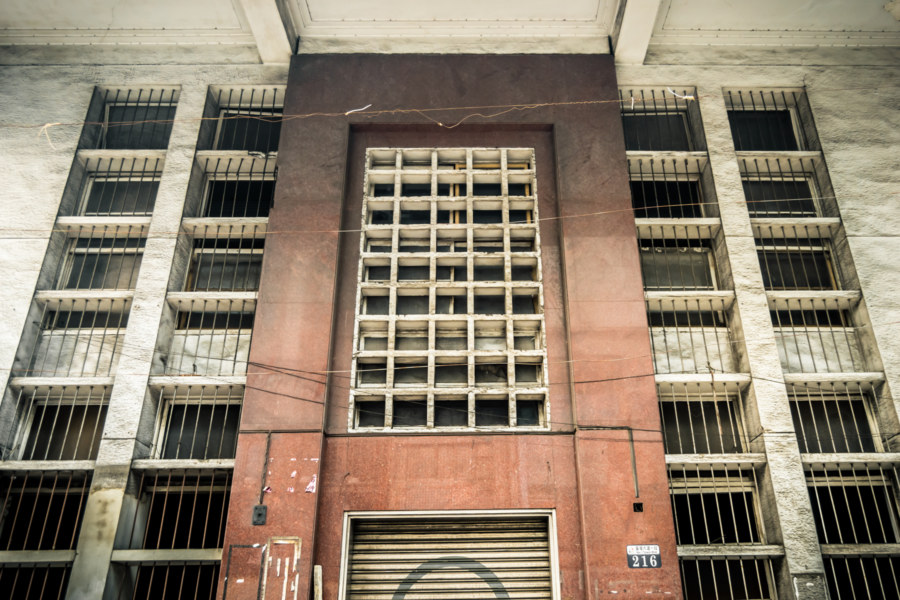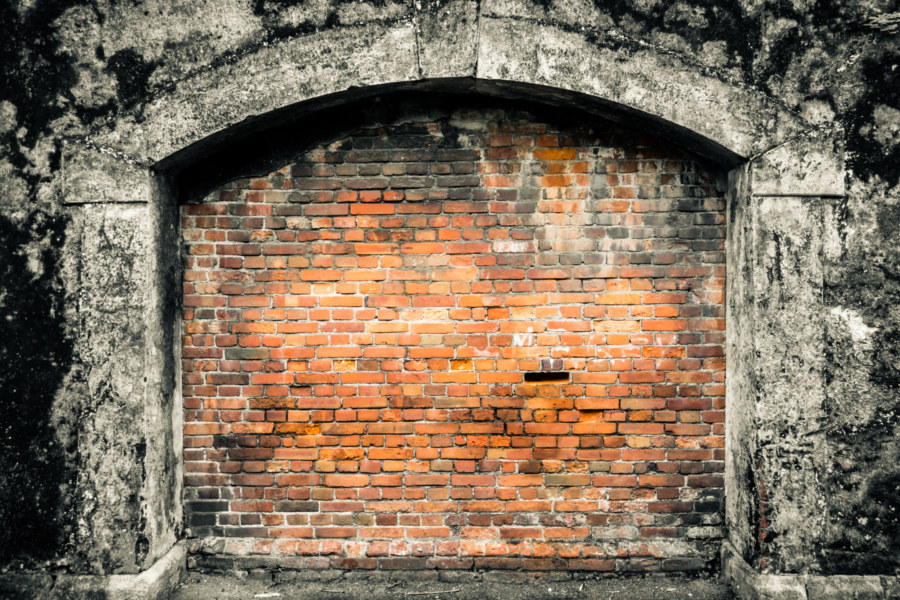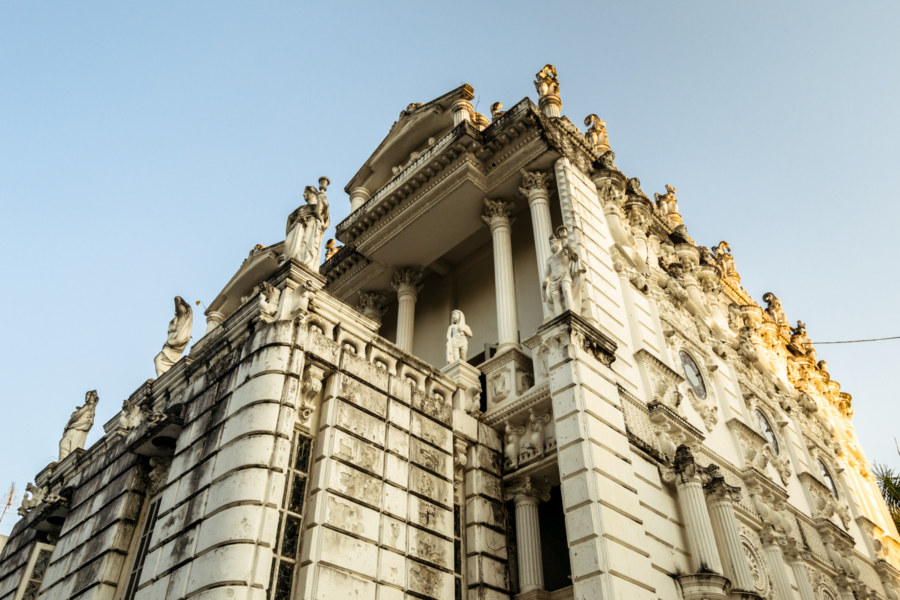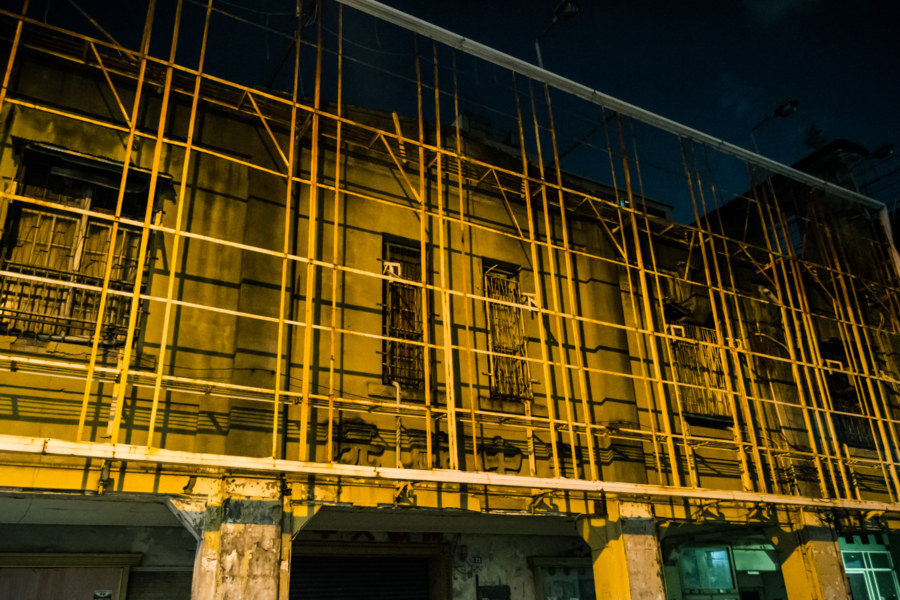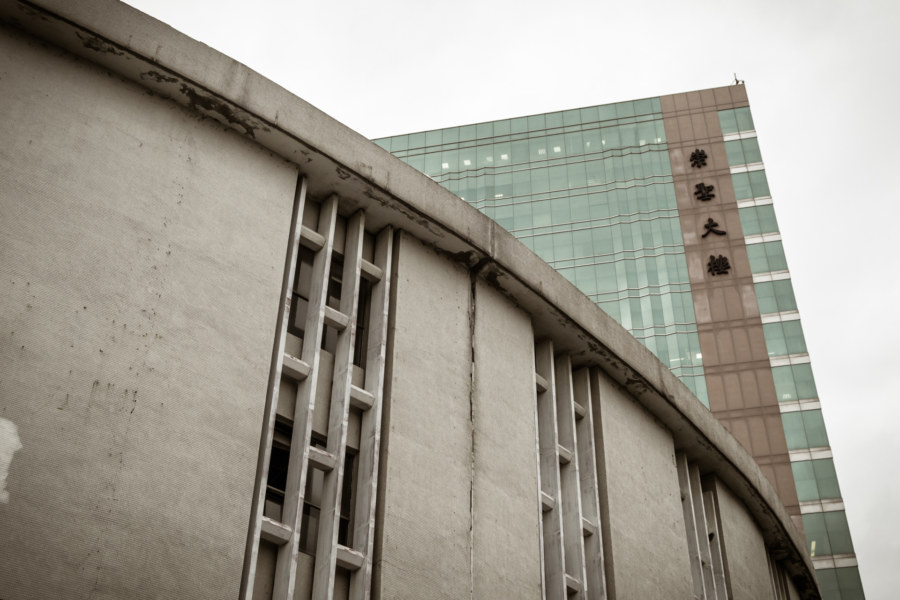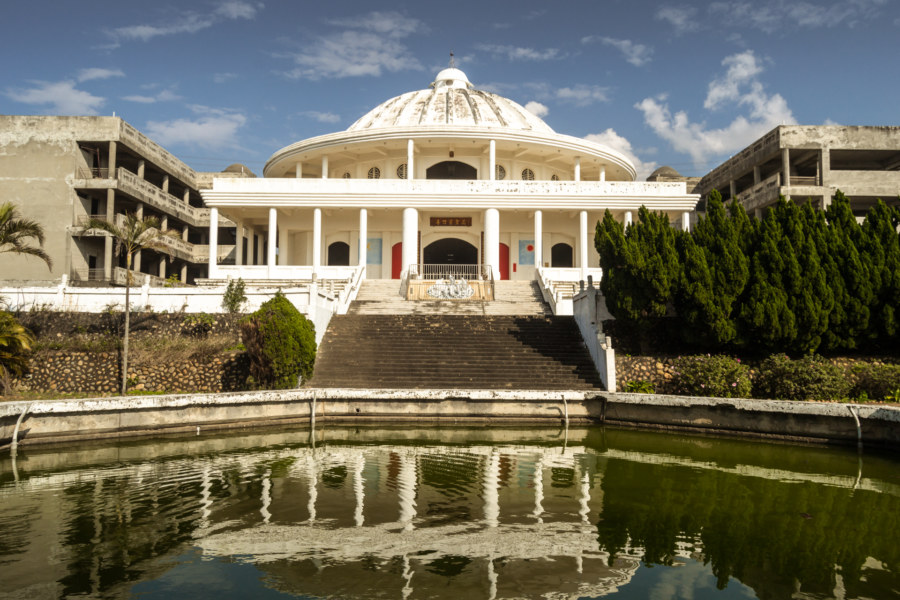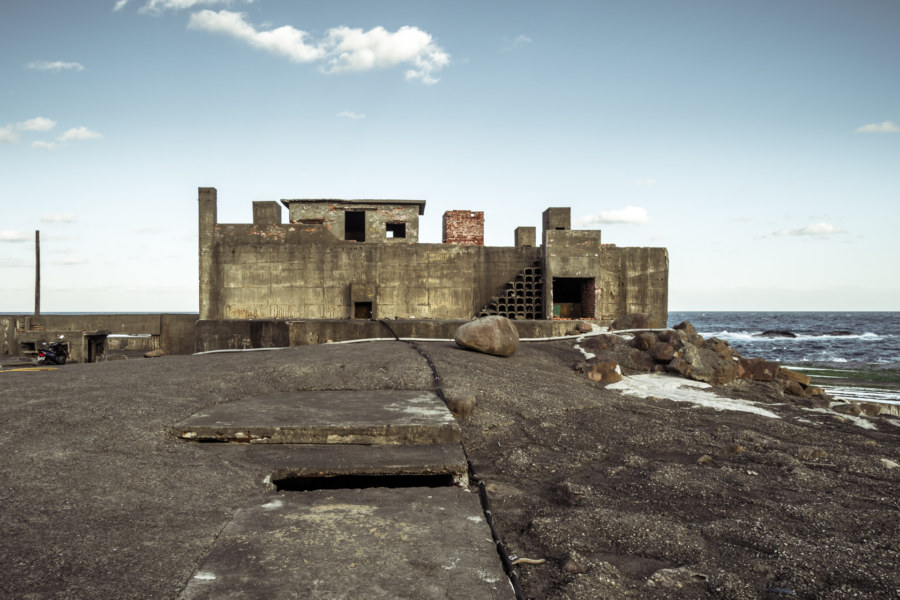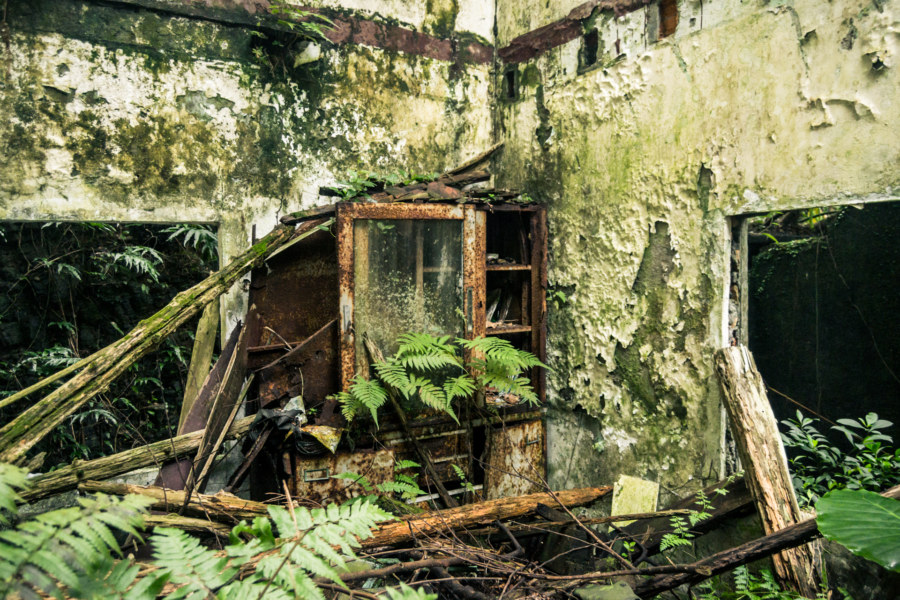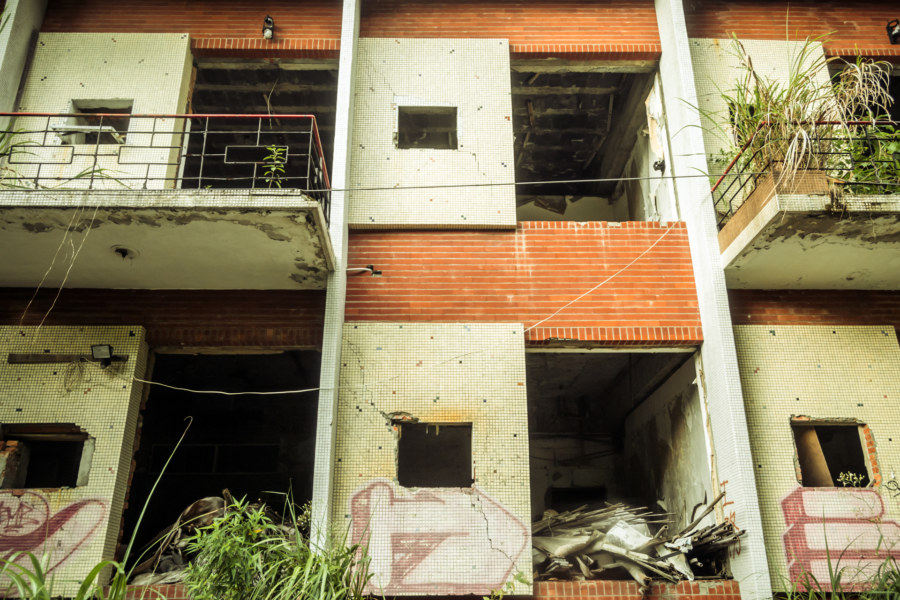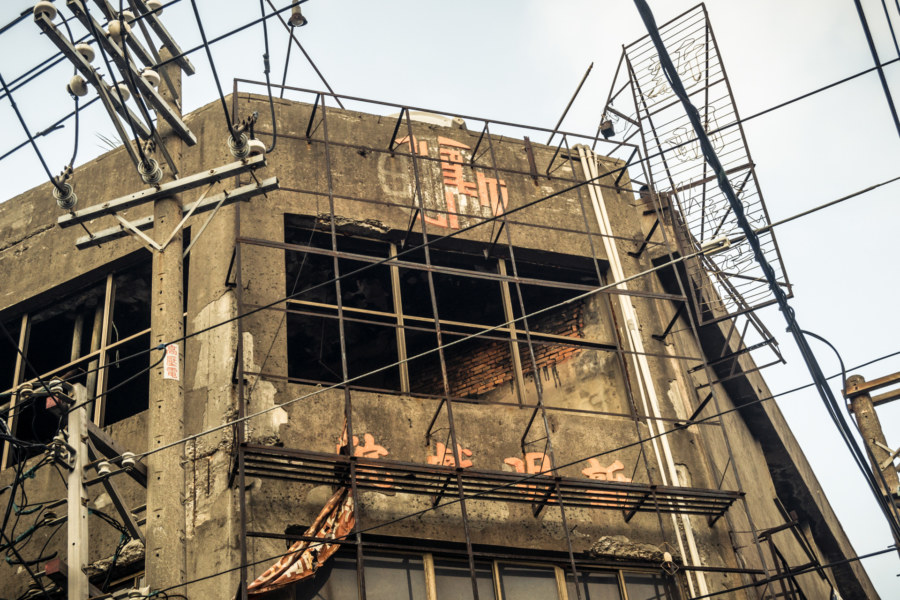Taichung First Credit Union 台中第一信用合作社 is a post-war bank located in Central Taichung. According to this blog it was abandoned in 2001. Last week I went to go take a quick look while surveying the many historic buildings in the area. There were construction workers setting up in front and there were no other points of entry so I did not gain access. Even so, from a quick look inside the place appears to have been cleared out—and they might even be preparing to renovate the building for one reason or another.
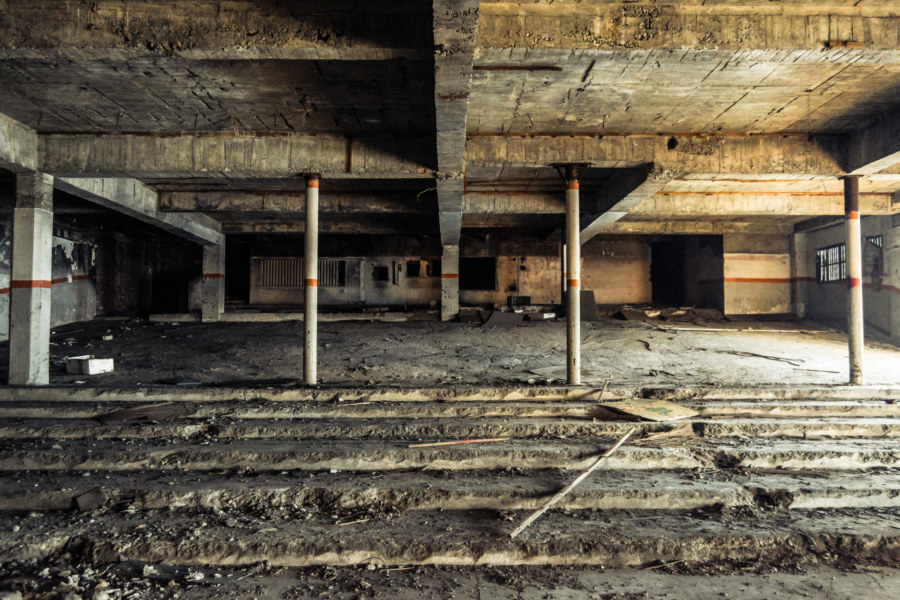
Urban exploration or urbex (Chinese: 城市探險 or 廢墟探險; Japanese: haikyo 廃墟) is the exploration of manmade structures and artificial environments, particularly those found beyond the margins of everyday society. This includes abandoned and disused spaces but also rooftops, underground infrastructure, and many other places not normally open to casual examination. Despite the name the practice is not limited to cities, nor is the focus exclusively on abandoned places. Urbex culture varies across the globe but one unifying convention most explorers adhere to is "take nothing but pictures, leave nothing but footprints".
Subterms
The Remains of Taipei Prison 臺北監獄圍牆遺蹟
Not much remains of the old Taipei Prison (台北刑務所) except the walls along the north and south sides of the prison grounds. Originally known as Taihoku Prison (after the Japanese name for Taipei), it was built in 1904 to incarcerate a burgeoning population of political dissidents, revolutionaries, and activists resisting Japanese colonial rule, though the authorities also imprisoned common criminals here as well. It was also the scene of the needless execution of 14 American soldiers a mere 58 days before the end of World War II. The KMT continued to operate the prison into the bleak years of the White Terror (白色恐怖) before razing it to the ground in 1963.
White Lion House, Chiang Mai
Last year I shared my exploration of the House of Success, an extravagant palatial ruin in the northwest corner of Chiang Mai immediately inside the old city walls. In that post I noted that there were two additional buildings of a similar style at the same site, one an active business and the other occupied by squatters. Returning this year for a second visit I was surprised to see that the squatters had left. Wasting no time, I strode into the Jangmuarinnakorn House, more generally known as the White Lion House, to document a previously missing piece of the puzzle.
Fengzhong Theater 豐中戲院
Fēngzhōng Theater 豐中戲院 is one of many abandoned theaters in downtown Taichung. Located a stone’s throw away from Taichung Station, this theater was originally the Taiwan Opera Theater 台灣歌劇戲院, a performance venue founded at the very end of Japanese colonial rule in 1944. According to this source the name was changed to Fengzhong Theater when it was converted for use as a cinema in 1953. It was in continuous operation until 2004 when it was closed and finally abandoned.
Second Taipei City Council Building 第二台北市議會大廈
One of the more peculiar ruins I’ve seen in Taiwan was a building immediately across from the Control Yuan (監察院), one of the five branches of government, on Zhōngxiào West Road (忠孝西路). It was inaugurated as the second home of the Taipei City Council (台北市議會) in 1964 after moving from nearby Zhongshan Hall (中山堂). In 1990 the city council relocated to its present base in Xinyi and the building was converted into a police station before being completely abandoned in 2007. Despite this the building continued to be known as the Second Taipei City Council Building (第二台北市議會大廈).
Wansheng Zizhu Monastery 萬聖紫竹寺
Wànshèng Zǐzhú Monastery (萬聖紫竹寺) is an unusually austere temple located on the seaward slope of the Dadu Plateau (大肚台地) in Shalu, Taichung. At first I assumed it was abandoned, for there was absolutely nobody around when I visited. The main hall is in an obvious state of disrepair and the two flanking buildings remain unfinished. After wandering into both altars I left with more questions than answers. Apart from the Putuoshan White Temple it isn’t at all like most other temples I’ve seen in Taiwan.
Explorations of the Pacific Edge 1
These photos were taken two years ago after cycling through the Old Caoling Tunnel 舊草嶺隧道 into Toucheng, Yilan. The first set of six photos were all shot along the rugged shoreline of the Láilái Geological Area 萊萊地質區 while the last four were captured at Mǎgǎng 馬崗, a half-abandoned fishing village on Cape San Diego 三貂角 (pinyin: Sāndiāojiǎo), the easternmost tip of Taiwan. All were captured in Gongliao. From here the vast Pacific Ocean stretches all the way to Baja California in Mexico.
Ruchuan Village 入船里
Rùchuán Village 入船里 is a small community in Keelung, a historic port town of approximately 373,000 scattered among the rugged hills of northeastern Taiwan. Keelung’s growth over the last century has been constrained by a lack of flat land on which to build—with much of that concentrated at the foot of the harbour that now constitutes the downtown core. With few other options for expansion the city has sprawled upward along the hillsides and deep into the many valleys leading up from the port.
Beitou Asia Pacific Resort 北投亞太溫泉生活館
On the last day of my round-the-island bicycle tour of Taiwan I undertook a brief excursion to the hot springs area of Beitou. I had expected the previous night to be my last on the road but a series of flat tires kept me from finishing my journey. With time to spare the following day I took a meandering route back to Taipei and, as luck would have it, also chanced upon one more ruin to explore. Not too far up the road from the majestic Thermal Valley (地熱谷) I noticed the crumbling outlines of a building that I correctly assumed was a derelict hot springs hotel: Asia Pacific Resort (北投亞太溫泉生活館).
Zhongli Xinming Theater 中壢新明戲院
In the last year or so I have found and explored numerous abandoned movie theaters in Taiwan. It all started when I stumbled upon Datong Theater (大同戲院) in Taitung City last June. Since then I have learned much more about the Taiwanese cinema industry: how many theaters are likely to be found in a city of a given size, where they are likely to be found, when they were likely to have been abandoned, and so on. Not long after moving to Zhongli a few months ago I put this growing awareness to the test by cycling around town one morning, finding several theaters new to me, all within close proximity to one another. One of these, Xīnmíng Theater (新明戲院), is the subject of this post. Public records indicate the business was registered around 1980 and lapsed in 1997, though it almost certainly closed sometime before then.
